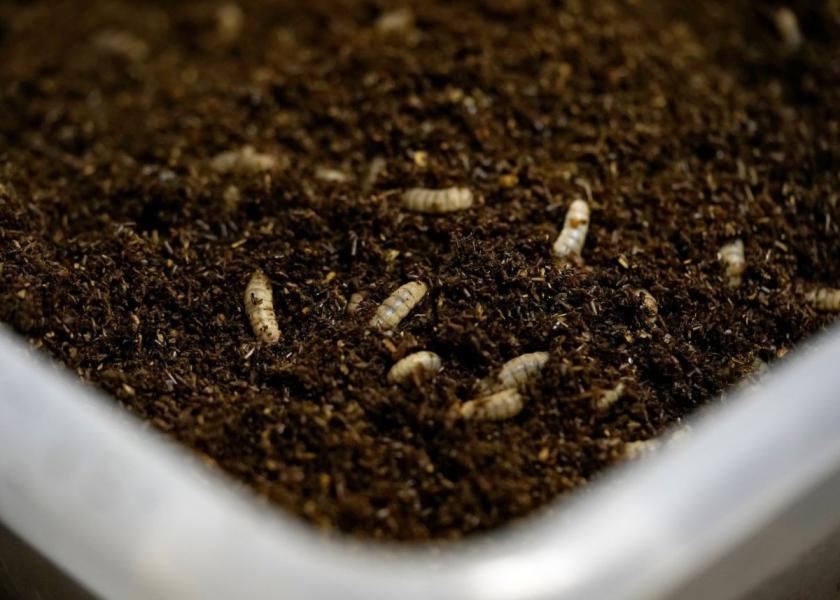Researchers Look to Transform Manure into Protein

Can you turn manure into a cow, chicken or fish?
Texas A&M AgriLife Research scientists are looking to do just that, in a roundabout, circular economy, kind of way.
A three-year, $618,000 grant from the U.S. Department of Agriculture National Institute for Food and Agriculture is funding a study by scientists in the Texas A&M College of Agriculture and Life Science Department of Entomology and Mississippi State University to explore dairy manure clean-up via black soldier flies. The team would then examine the flies’ value as a potential ingredient in livestock, poultry and aquaculture feed.
The project will concentrate on both environmental health and economic benefits of converting dairy waste into protein that could be used for feed. Early data indicate probiotics could be used to accelerate the digestive process in fed animals, increase conversion of waste to insect biomass, decrease greenhouse gases and noxious odors, and reduce concerns about pathogens that might be present in the manure.
The study will be led by Jeff Tomberlin, Ph.D., professor, AgriLife Research Fellow, Presidential Impact Fellow and Center for Environmental Sustainability through Insect Farming director, and Anjel Helms, Ph.D., an assistant professor and chemical ecologist, both in the Department of Entomology.
Heather Jordan, Ph.D., associate professor and microbiologist at Mississippi State University, will examine the resulting larvae and frass, which is the material remaining after larvae digest manure, for microbial diversity and feed safety. Helms’ postdoctoral research associate Amber MacInnis, Ph.D., will lead the day-to-day data collection with the help of students.
“We’re testing the limits of black soldier fly production in conjunction with probiotics to see how efficient they could be for large animal production facilities, in this case dairies,” Helms said. “Manure management is an expense to these producers, and we are testing to see if this is a way to manage that waste and turn it into a productive feed source.”
Turning an expense into a resource
Black soldier fly larvae consume their weight in organic waste daily for a two-week period – around 1 gram or the weight of a single raisin per larva. That may sound insignificant, but those amounts add up when multiplied by millions of black soldier fly larvae.
For example, existing facilities in Europe, Asia and North America can digest 100 tons of waste daily using black soldier fly larvae.
MacInnis’ experiments are done in plastic containers filled with around 18 pounds of manure where 10,000 black soldier fly eggs are placed. The larvae hatch, consume the dairy manure for two weeks and then are harvested, and then the process is repeated.
An important part of the project is to determine how safe harvested larvae are when converted into ingredients for feed. Little is known about pathogen diversity in larvae that consume manure that in turn could impact feed safety. Helms suspects larvae consuming manure are safe for livestock consumption, but the end-product must be certified.
“This is an exciting study to be a part of because it is problem-solving at its core,” MacInnis said. “These dairies produce an enormous amount of waste. If black soldier flies can be an efficient part of their management process and provide other benefits, that could be a big breakthrough across the industry.”
Layers of potential benefits from waste conversion
Black soldier flies consume organic waste, including manure, but the process of waste conversion leaves room for efficiency improvements.
The study will utilize probiotics to enhance black soldier fly waste conversion of dairy manure and remove more than 50% of nitrogen and potassium from the waste. Helms said the team is working with Jordan to study the probiotic impacts.
Manure conversion by black soldier flies is also expected to provide an environmental benefit beyond reducing reliance on traditional manure management methods like waste storage lagoons.
“There is potential for layers of economic and environmental benefits to incorporating black soldier flies in manure management,” Helms said. “Turning waste into a resource sounds too good to be true, but we are understanding more and more about the ways black soldier flies can solve a lot of problems.”
Read More:
Black soldier fly larvae oil: A possible new ingredient for pig diets







